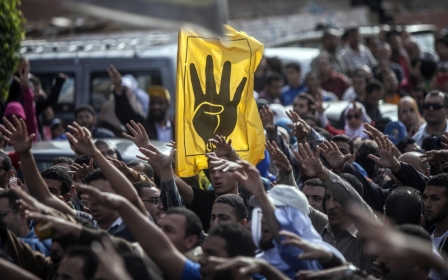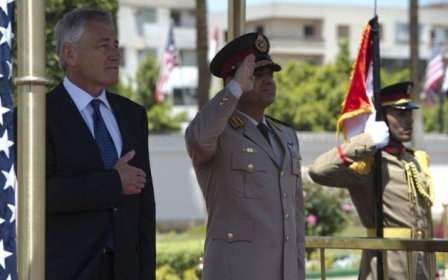Minya court confirms mass brotherhood death sentences

MINYA, Egypt - An Egyptian court on Saturday confirmed death sentences for more than 180 Islamists, including Muslim Brotherhood chief Mohamed Badie, after a mass trial that sparked an international outcry.
The court in the central city of Minya initially sentenced 683 people to death, but on Saturday commuted death sentences of four defendants to life in prison, including two women, and acquitted 496 others, prosecutor Abdel Rahim Abdel Malik told AFP.
Since the army ousted Islamist president Mohamed Morsi in July last year, hundreds of his supporters and Badie himself have been sentenced to death in trials roundly criticised by human rights watchdogs.
The 183 sentenced to death on Saturday were convicted of involvement in the murder of two policemen and the attempted murder of five others in Minya province on August 14, the day police killed hundreds of Morsi supporters in Cairo clashes.
They were also found guilty of vandalism, attacking public property, bearing arms and joining illegal organisations, Abdel Malik said.
Lawyers said most of those sentenced to death were still on the run.
"The defence lawyers were unable to attend the trial and defend their clients. The court violated the defendants' rights of defence and gave its decision quickly," said one, Mohammed Tosson, adding they intended to appeal.
Journalists were also barred from attending the trial.
The decision came after the court referred its initial April ruling to Egypt's top Islamic scholar, as required under Egypt's legal system.
Defence lawyer Khaled Elkomy said the case was full of "flaws".
"The judge referred 683 defendants to the grand mufti because he believed that they were guilty... he then returned and acquitted most of them," Komy said.
"This shows that the judge did not even study the case properly."
In March, the same court reduced to life in prison 492 of 529 death sentences passed on another batch of Morsi supporters.
'Allah acquitted my brother'
Outside the court on Saturday, as masked policemen stood guard, relatives reacted to the verdict.
"I swear that my brother has nothing to do with politics and the Muslim Brotherhood. He does not even pray," said Ahmed, 40, of his brother who was sentenced to death.
Another man expressed relief.
"Allah revealed the truth. Allah acquitted my brother," he said.
The mass trial comes amid a crackdown on Morsi's supporters that has seen more than 1,400 people killed since his ouster, with more than 15,000 jailed.
The crackdown has extended to secular-leaning dissidents who supported Morsi's overthrow but then turned against the military-installed regime that ruled before ex-army chief Abdel Fattah al-Sisi was elected president last month.
Badie, the Brotherhood's spiritual guide, was this week handed a death sentence by another court that accused him and 13 others of inciting violence that killed 10 people near Al-Istiqama mosque in Cairo's Giza neighbourhood.
In January 2010, Badie was elected the Brotherhood's eighth chief since its foundation in 1928 after a bitter dispute between ideologically focused conservatives and reformists.
The initial death sentences were defended by the authorities who insisted they were issued only after "careful" consideration and were subject to appeal.
"The verdicts in this case provide the latest example of the Egyptian judiciary's bid to crush dissent," Amnesty International's Hassiba Hadj Sahraoui said in a statement.
"Clearly, Egypt's judicial system is broken and no longer able to deliver justice. The death penalty is being ruthlessly deployed as a tool to eliminate political opponents."
Sisi won the presidential election riding on a wave of popularity after leading Morsi's ouster.
Rights activists fear that under his presidency Egypt could see autocracy worse than under Hosni Mubarak, who stepped down in 2011.
Sisi has signalled he intends to return Egypt to stability rather than encouraging democratic freedoms.
Stay informed with MEE's newsletters
Sign up to get the latest alerts, insights and analysis, starting with Turkey Unpacked
Middle East Eye delivers independent and unrivalled coverage and analysis of the Middle East, North Africa and beyond. To learn more about republishing this content and the associated fees, please fill out this form. More about MEE can be found here.




